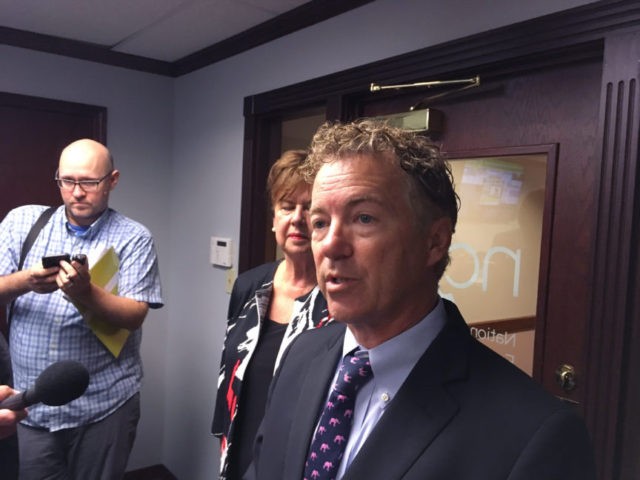WASHINGTON (AP) — The Republican drive to tear down President Barack Obama’s health care law was flickering out Monday as a decisive handful of GOP senators remained opposed to the last-gasp bill. Changes aimed at galvanizing GOP support produced no apparent additional votes as time was running out for the White House and party leaders.
Angry, yelling protesters forced the Senate Finance Committee to briefly delay the chamber’s first and only hearing on the charged issue. Police lugged some demonstrators out of the hearing room and trundled out others in wheelchairs as scores chanted, “No cuts to Medicaid, save our liberty.”
“If you want a hearing, you better shut up,” panel Chairman Orrin Hatch, R-Utah, as the noise erupted.
The electricity in the room captured the high stakes as the two parties battle over whether to defend or obliterate Obama’s 2010 overhaul. Three July failures by Republicans to push earlier bills through the Senate led Democrats to rejoice and infuriated conservatives, prompting President Donald Trump to repeatedly savage GOP senators who blocked the party’s yearsold goal of repeal.
Republicans have pinned their last hopes on a measure by GOP Sens. Bill Cassidy of Louisiana and South Carolina’s Lindsey Graham. The measure would end Obama’s Medicaid expansion and subsidies for consumers and ship the money — $1.2 trillion through 2026 — to states to use on health services with few constraints.
Overnight, the sponsors added billions of extra dollars for states and language easing Obama’s coverage requirements in hopes of winning over wavering GOP senators.
But by Monday afternoon, GOP Sens. John McCain of Arizona and Kentucky’s Rand Paul remained against the measure. Republican Maine Sen. Susan Collins seemed a certain opponent, Alaska GOP Sen. Lisa Murkowski was undecided and Texas Sen. Ted Cruz was opposed but senior aides said he was looking for changes so he could vote yes.
With their narrow 52-48 majority and solid Democratic opposition, three GOP “no” votes would doom the bill.
The Senate must vote this week for Republicans to have any chance of prevailing with their narrow margin. Next Sunday, protections expire against a Democratic filibuster, bill-killing delays that Republicans lack the votes to overcome.
On Monday, Trump took on McCain, who’d returned to the Senate after a brain cancer diagnosis in July to cast the key vote that wrecked this summer’s GOP effort. Trump called that “a tremendous slap in the face of the Republican party” in a call to the “Rick & Bubba Show,” an Alabama-based talk radio program.
Cassidy and Graham defended their bill before the Finance committee.
“I don’t need a lecture from anybody about health care,” Graham told the panel’s Democrats, whose party uniformly opposes the measure. Referring to Obama’s 2010 overhaul, he added, “What you have created isn’t working.”
Also appearing was Sen. Mazie Hirono, D-Hawaii, who learned earlier this year that she has kidney cancer. She said colleagues and others have helped her battle the disease with compassion, saying, “Sadly, this is not in this bill.”
Republicans provided documents stating that 34 states would get more health money under the bill than under Obama’s law. Those included Alaska, Arizona, Kentucky, Maine and Texas — home to senators whose votes leaders were laboring to win.
Democrats said the GOP numbers were deceptive because they omitted the impact of cuts Republicans would impose on Medicaid, the health insurance program for the poor and disabled.
A spokesman for Sen. Rand Paul, R-Ky., said the lawmaker had not abandoned his previously announced opposition to the measure, saying the lawmaker wanted “significant” cuts in the law’s spending.
Paul’s continued opposition doused the hopes of White House officials who’d privately expressed optimism Paul might come aboard. They said Trump and his advisers have been in regular touch with the Kentucky senator.
Senior aides said Cruz still wanted additional steps to let insurers sell low-premium policies with sparse coverage, which Obama’s statute forbids.
Graham and Cassidy’s revamped proposal gives states more freedom to charge higher premiums for older and seriously ill people and to sell skimpy, lower-cost policies. The initial version, required federal approval for such action. It would also let states unilaterally raise limits Obama’s law has placed on consumers’ out-of-pocket costs.
___
Associated Press Washington bureau chief Julie Pace and reporters Laurie Kellman and Ken Thomas contributed to this report.

COMMENTS
Please let us know if you're having issues with commenting.